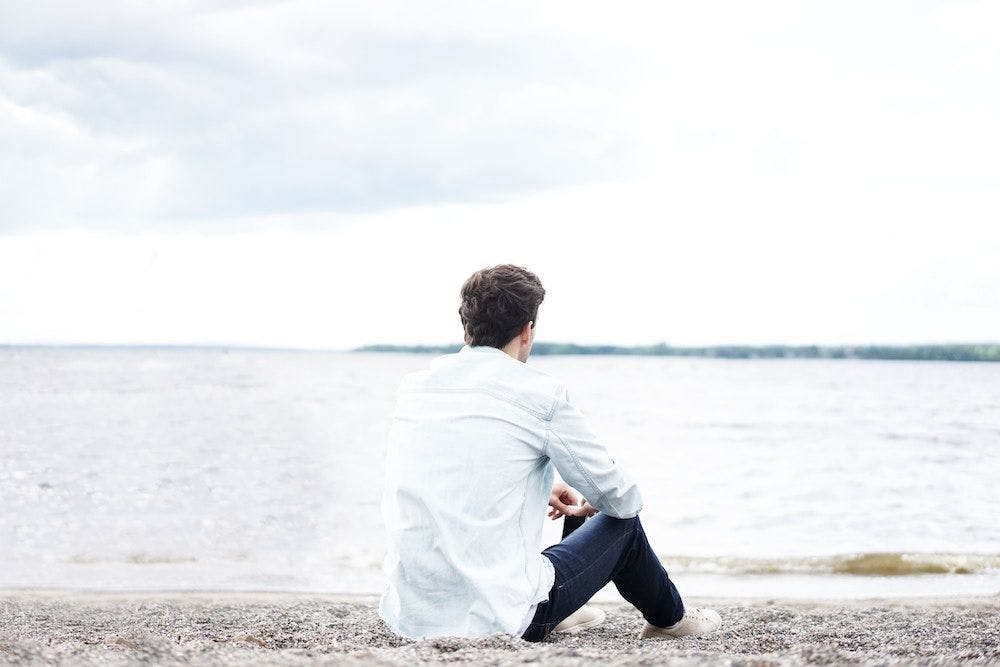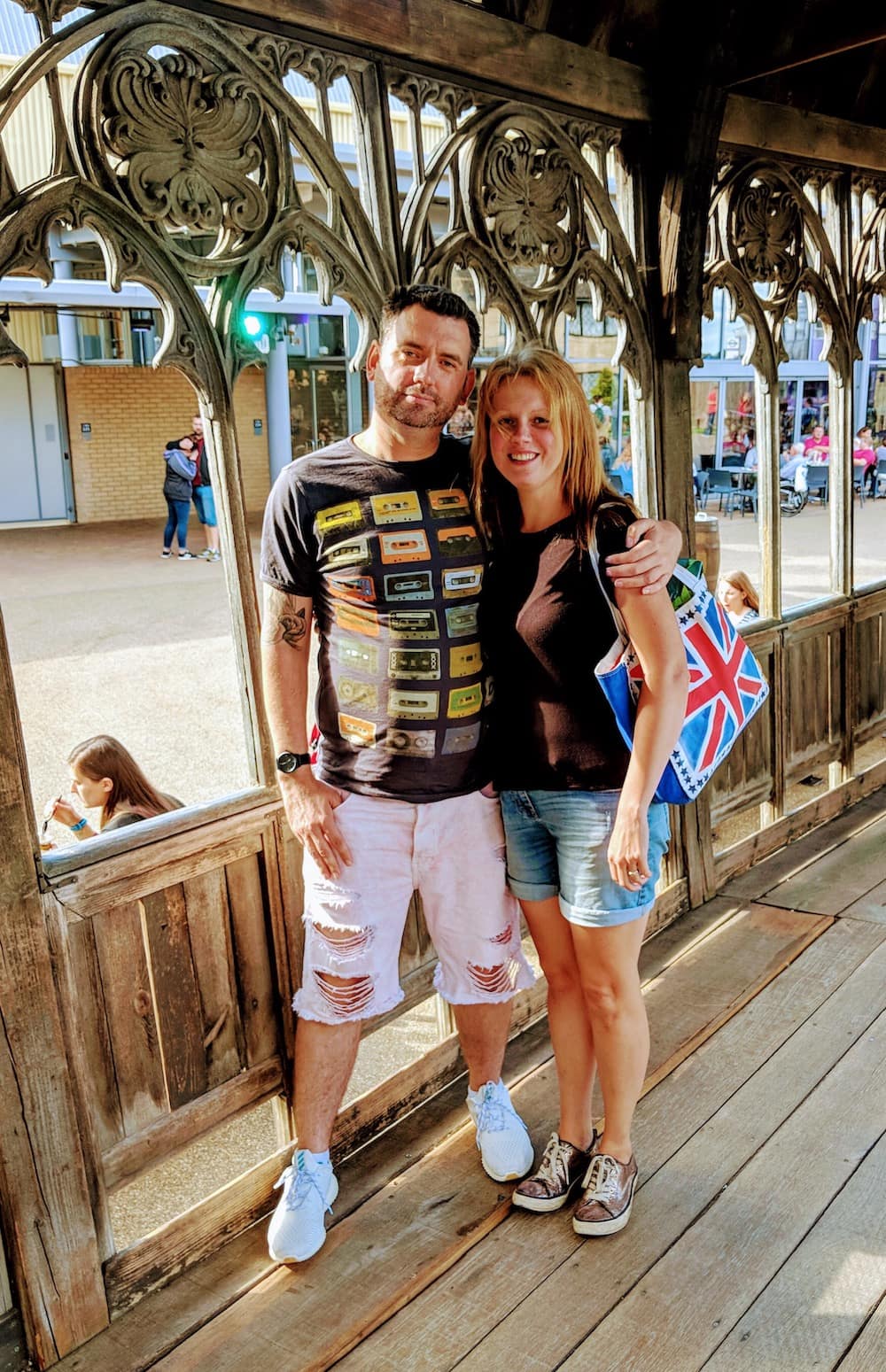
For years, Pete hid his mental anguish behind a mask of macho bravado. But it was only when he learned to talk honestly about his fragility that he found he could start his journey back to health
Sitting in A&E, in a vast white room, crying, and utterly terrified to the point of trying to take my own life, I thought it was all too much. I had been awake for days, every moment adding to the ever-deafening roar of anxiety.
I was underweight from not eating and my fears were crippling. Fear had eaten away at me, and my depression had reached all-encompassing depths. The NHS and my family pulled me through. Talking and being open helped in that journey.
I’m a man. From an Irish family. We didn’t talk ‘feelings’. My dad and grandad never showed emotion. The toxic black tide of masculinity ran through my family like Guinness. I’ve only had one hug from my dad, and that was when our team won at Wembley. We were always taught to ‘be a man’, never cry, always to ‘man up’ and fight.
So I never showed emotion, always just got on with it. Didn’t cry and bottled up all my feelings. Everything got pushed down, consigned to a box in my head. I carried on, putting on a show rather than revealing the true me. I’d swing from high to low. I’d go out and want to drink until the next morning, be the centre of attention and the life of the party.

Pete with his wife
I had to continually push my body to extremes. I’d work a day job, nine to six, then change and work in a nightclub from nine to three. To get noticed and to avoid having time alone, I’d do stand-up gigs in the evening, finding it easier to make 100 people laugh than have to talk to one person.
Over time, my anxiety and depression got worse. At first I just tried to ignore it, using nights out, alcohol, and reckless behaviour as a counterbalance to the dark times. It was much easier to have another pint, and try to forget, than to confront how I felt.
I needed to be in a relationship continuously, I couldn’t be alone.
But was impossible to live with. The anxieties worsened and the depression grew. I needed to calm down. I met my beautiful wife and went to see my GP. He prescribed citalopram, an antidepressant, which I took for a few months and carried on with life.
Another 10 or so years went by, with the occasional depressive spell, and I thought I’d worked it out. I’d had three incredible children and a fantastic wife; my friends were great, I was doing a job I enjoyed with people I liked, and life seemed to be going well for me.
But my anxiety had started to creep back. First, I couldn’t face heights anymore, then I couldn’t go into crowded spaces, then I struggled to go out at all. Work was becoming harder, self-doubt creeping in. Sleep was more fragile – I stayed up watching TV rather than listen to the voice in my head.
It got very dark. My mood was so low I decided to end my life. I got incredible care from the NHS and the crisis care team, who checked me, medicated me, and pulled me through. I moved back in with my mum – hard to do after 20 years away, but I felt safe there.
I lost a month, sleeping and recovering. Medication started to make me feel more human, and I began to talk. I had to try to adjust to a new life. For a while it was all very flat, and I was constantly tired from the meds. I stopped caffeine and alcohol – which I’ve continued to this day. It was a complete reset, helped along by family and friends.
Talking made an incredible difference. It’s like a release valve.
I started to exercise more. Because of the medication I couldn’t drive, so I had to walk anywhere I needed to go. It was tiring at first, then easier, then the walking became running. I started to enjoy running, building it up week by week. The runs got gradually longer and I was feeling a buzz from it. As the miles increased, my mood was improving, and I decided to try a marathon.
Running was my new dopamine hit. I’d go to the gym, or around the town, and it boosted my confidence. My family would come along to races, so it was fun for us all.
I ran the London Marathon and raised money for a mental health charity to say thanks for the help I’d had. It was tough going – being anxious and having your name screamed at you by strangers telling you to run faster is challenging – but it was also the most inspiring and magical day.
To see the London streets full of runners with different causes, with heartbreaking and heartwarming stories, supported by thousands of people to help you through, is stunning. My journey was minuscule compared to others, but just being there was a privilege.
Since the marathon, there have been good times and bad times. I’ve had a variety of medication – literally from A to Z, amitriptyline to zopiclone, with many others in between. I’ve put on a lot of weight as a side-effect, but I’d rather wear out clothes than my family.

Pete on a day out with his children
It’s strange to say, but I think that depression has improved me. I value every day I have with my family; we have more time together now, and it’s precious.
I’ve seen a psychotherapist, gained new understanding, and have been able to face some of my demons. Talking made an incredible difference. It’s like a release valve. I was open about my struggles to my male friends. I wish I had talked many years earlier. More people than I could have imagined have been open about their frailties – but only after I opened up.
We need to openly discuss mental health. As a man, I was always told not to – and suffered as a result. It shouldn’t be that way. There’s no shame, and that’s why I wanted to be open about my issues. I shared my story on Facebook and Instagram recently, and was overwhelmed by the positive response. It was wonderful to get nice messages and support from friends. I found it was much better to open up than to man up.
My illness used to make me feel like a bad Daft Punk song: ‘Older, Greyer, Fatter, Weaker’. It made me doubt everything, and destroyed my life. I’ve used alcohol, drugs, caffeine and promiscuity to try to block it out. I should have opened up. Those dark bubbles that you bottle up inside will just go flat if you let them out.
There are ups and downs, but now I don’t have to hide. The dark moments are surrounded by lots of light. I’ve been so lucky to have incredible support at home and at work, people who have guided me through and make me glad to be who I am.
My illness doesn’t define me, or own me. Being open has helped me to understand the illness and myself. Opening up wasn’t easy, but it’s the best thing I did.
Fe Robinson | MUKCP (reg) psychotherapist and couples counsellor, says:
Pete’s journey shows that being strong is not about bottling things up and holding them in, it’s about having the courage to let yourself experience what is inside you. Social norms are changing, and it’s good that we are encouraged to speak more openly about our problems. It’s great to hear how well supported Pete has been; I wonder what support readers might access if they let the people around them in.
To find a counsellor near you, visit Counselling Directory or use the search box below.

